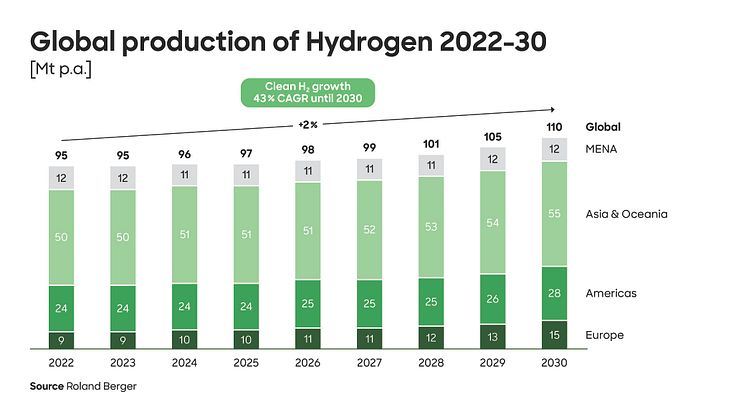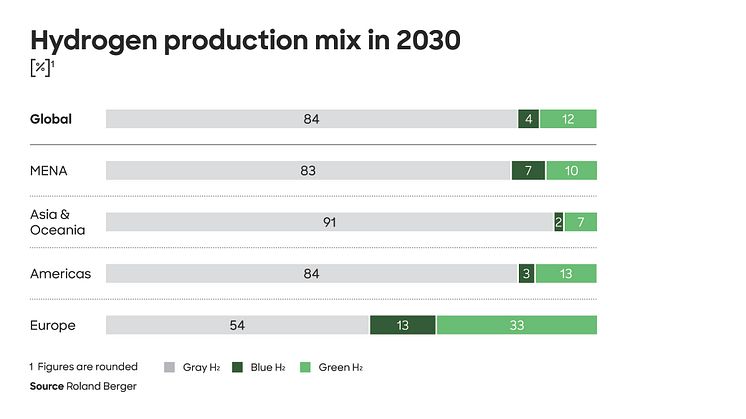
Press release -
Roland Berger study: Hydrogen production of 110 million tons per year expected for 2030
- In 2030, 12 percent of hydrogen will be produced "green", meaning climate-neutral
- Hydrogen production could increase to 240 Mt per year by 2040, the capacity of hydrogen electrolyzers required for this would be 1 TW
- In the 2030s, the expansion would therefore have to be as high each year as in the entire previous decade
Munich, December 2023: Hydrogen is an important building block for decarbonization worldwide. By 2030, global hydrogen production will increase to 110 million metric tons (Mt) per year, and probably to 240 Mt by 2040, according to the recent study by Roland Berger "The Roaring '30s – A clean hydrogen acceleration story".
"Currently, the expansion of electrolysis capacities is too low to meet the Paris climate targets. In the 2030s, we will have to add as much capacity every year as in the entire previous decade," says Yvonne Ruf, Partner at Roland Berger. "The remaining years of the current decade are crucial to create the structural conditions for the next decade to be a phase of acceleration. Because if hydrogen does not establish itself as a competitive alternative for decarbonization, the debate could shift to the relocation of energy-intensive industries to countries that enable lower production costs thanks to low-cost clean energy, financial incentives or better legal frameworks."
"Roaring '30s"– the 2030s will be a crucial decade
According to calculations by the authors of the study, the global hydrogen production will grow by an average of two percent per year until 2030. Around twelve percent of the total volume by 2030 will be green hydrogen, which will be produced in a climate-neutral way using renewable energies. "We estimate that 119 gigawatts (GW) will be added to hydrogen electrolysis plants by 2030. This is less than half of the 260 GW that governments have committed to globally and only around a fifth of the 590 GW that would be needed to achieve the 1.5-degree target," explains Uwe Weichenhain, Partner at Roland Berger. "The 2030s will therefore become a critical decade for the hydrogen industry. We will see a massive acceleration of decarbonization and hydrogen production."
According to Roland Berger's forecast, based on the historical expansion rate, the annual production volume will probably increase to 240 Mt of hydrogen by 2040. This would correspond to a need of 1 TW of installed electrolysis capacity. The demand will become increasingly diversified in 2040. In addition to the manufacturing industry, which will consume almost half (48 percent) of the hydrogen produced, the mobility and energy sectors will play a major role on the demand side, accounting for 30 percent and 15 percent respectively. The heating of buildings will account for seven percent of demand.
Structural policy measures necessary
The most important success factor for the hydrogen strategy outlined in the study is an attractive economic framework that makes clean hydrogen an affordable alternative. According to the authors of the study, it is time to move away from discussions about detailed issues such as standards, definitions for green hydrogen or measurement methods for CO2 emissions. "The central task for the rest of this decade is to create a structural framework, because isolated incentives and regulations lead to isolated projects," says Ruf.
The first initiatives are already underway. For example, tax incentives under the Inflation Reduction Act in the USA support the low-cost production of clean hydrogen. In Europe, regulations such as Sustainable Aviation Fuels and quotas for alternative fuels have created a reliable market for hydrogen. Such structural policy decisions now need to be scaled and expanded, emphasizes Weichenhain: "If we lay the foundations today, we can achieve the much-needed acceleration of hydrogen production and ensure that we achieve the global goal of decarbonization."
Topics
Categories
Roland Berger is the only management consultancy of European heritage with a strong international footprint. As an independent firm, solely owned by our Partners, we operate 51 offices in all major markets. Our 3000 employees offer a unique combination of an analytical approach and an empathic attitude. Driven by our values of entrepreneurship, excellence and empathy, we at Roland Berger are convinced that the world needs a new sustainable paradigm that takes the entire value cycle into account. Working in cross-competence teams across all relevant industries and business functions, we provide the best expertise to meet the profound challenges of today and tomorrow.





